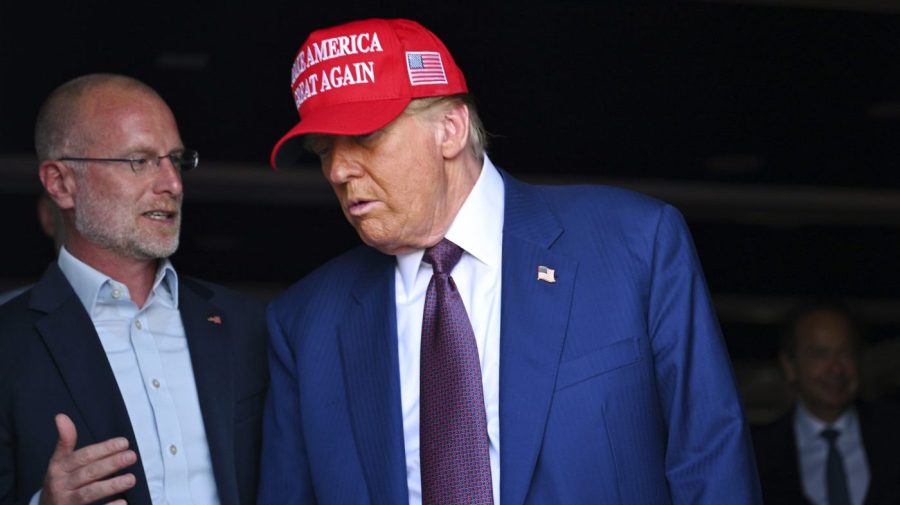
Last week, President-elect Donald Trump promised to elevate Brendan Carr from commissioner to chair of the Federal Communications Commission, calling Carr a “warrior for free speech.” Nothing could be further from the truth.
In a cringeworthy campaign to appeal to Trump, Carr has seized on Trump’s threats to penalize broadcasters for fact-checking him or giving airtime to his political opponents. Following through on these threats would almost certainly violate the First Amendment. Yet even the threat alone is chilling — a government official vowing to punish the president’s opponents for exercising their fundamental rights.
Carr has shown that he is willing to break with longstanding and bipartisan FCC precedent to punish Trump’s detractors. The FCC traditionally avoids regulating broadcast radio and television content except in extremely narrow circumstances, such as indecency. During a September hearing in the House of Representatives, Carr declined to speak out against Trump’s suggestion that ABC should lose its broadcast licenses because two of its journalists fact-checked him during his debate with Vice President Kamala Harris.
In October, Carr attacked NBC after Harris appeared on “Saturday Night Live,” wrongly calling it “a clear and blatant effort to evade the equal time rule” — all while NBC did indeed give Trump equal time that same weekend. Carr suggested on a subsequent Fox News appearance that the FCC should “keep every remedy on the table,” including revocation of NBC’s broadcast licenses.
That same month, he blasted CBS for airing an edited interview with Harris during “60 Minutes,” suggesting that CBS stations may be in violation of the FCC’s seldom-invoked news-distortion policy. Carr says he will look into the “news distortion” angle as part of the FCC’s review of the Skydance-Paramount merger (Paramount is CBS’s parent company).
Carr hasn’t just flirted with violating the First Amendment rights of companies the FCC has clear authority to regulate — he plans to extend his crusade to entities the agency has no mandate to oversee.
In a chapter he wrote for Project 2025, the Heritage Foundation’s authoritarian roadmap for a conservative administration, Carr argued for a dramatic expansion of the FCC’s authority so it can regulate the speech of social-media platforms. In addition to banning TikTok, Carr wants to strip social-media companies of their rights to moderate content, which would force them to host toxic racism, misogyny and other forms of hatred that are unpopular with advertisers and the public alike. So much for small-government conservatism.
Carr’s overreach extends even beyond social-media platforms to independent nonprofits and journalists. Under the guise of dismantling the “censorship cartel,” Carr recently penned a letter to major social-media platforms like Facebook and Google to pressure them to stop working with NewsGuard, a nonpartisan organization with “investors, advisors and leadership across the political spectrum” that helps people find reliable news and information.
Fortunately, FCC commissioners and even agency chairs don’t get to invent their own job descriptions, no matter what Carr’s bizarre ideas might suggest. The FCC is an independent agency created by Congress, and its power is limited to what Congress has delegated. As of now, Carr has no jurisdiction to go after social-media companies or nonprofit fact checkers.
As a sitting FCC commissioner, Carr doesn’t require Senate confirmation to become chair. That means he won’t face a panel of senators who might urge him to put the public interest and freedom of speech ahead of his allegiance to the incoming president. Once Trump takes office in January, Carr will be made chair and will be able to set the agency’s agenda.
In light of the threats he poses, it’s urgent that Congress provide oversight and demand that Carr commit to protecting free speech and the public interest. And anyone who cares about free speech — whether from inside or outside of government — should speak out against Carr’s plans to undermine it.
As an FCC commissioner, Carr took an oath to uphold the Constitution. He owes that to the American people.
Jessica J. González is co-CEO of the nonpartisan media-advocacy group Free Press. She is an attorney who has practiced before the Federal Communications Commission for the past two decades.












